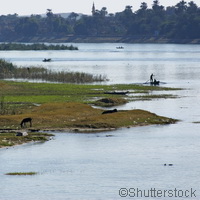EU-funded study calls for better protection for freshwater ecosystems
Current methods used to plan conservation strategies are not providing adequate protection for freshwater ecosystems and the ecosystem services they provide, according to African and European researchers in a new study published in the journal Conservation Letters. The scientists, from Belgium, Germany, the Netherlands, Senegal, South Africa, Switzerland and the United Kingdom, were supported by the EU-funded BIOFRESH ('Biodiversity of freshwater ecosystems: Status, trends, pressures, and conservation priorities') project, which is supported by a EUR 6,465,406 grant under the 'Environment' Theme of the EU's Seventh Framework Programme (FP7). Freshwaters are one of the most threatened ecosystems globally and although they occupy less than 1% of the Earth's surface they are home to over a third of the world's known species and around a third of all vertebrates. Human population growth and economic development have continued to threaten the health of many global freshwater ecosystems, throwing into jeopardy their ability to support biodiversity and provide ecosystem services such as irrigation, sanitation and food supply to humans. The international researchers are calling for more primary information on freshwater biodiversity status and distribution to support more effective conservation planning and investment. The study's findings are based on a comprehensive assessment of freshwater biodiversity across Africa, the most in-depth study of freshwater biodiversity across an entire continent ever carried out. They cross-checked data on range maps for 4,203 freshwater species and 3,521 land species across Africa with data on protected area coverage, large dam presence, rural poverty and the IUCN (International Union for Conservation of Nature) Red List, a catalogue that ranks plants and animals at risk of global extinction as either Critically Endangered, Endangered or Vulnerable. With all this data they were then able to analyse the status, threats and protection for freshwater biodiversity. The researchers found that the problem lies in where research is focused, with most support directed to land species and so-called 'charismatic species'. Charismatic species refers to the act of raising support for the protection of one particular well known and 'charismatically' appealing species, such as the panda for example. Environmental groups often try to raise support for a whole ecosystem by using one species as the 'poster species'. However, in reality, as the new study shows, with so much emphasis on charismatic and land species, efforts to highlight the distribution and threat towards many freshwater species go relatively unnoticed. The team found that conservation priorities and investment targets based on our knowledge of birds, mammals and amphibians alone may not be appropriate for freshwater species such as fish, molluscs and crabs. Often, protection plans for freshwater ecosystems are drafted using 'surrogate' species. However, the team warns this leaves them under-protected from a variety of human and climate-based threats. Freshwater ecosystems are dynamic and transboundary in nature meaning that their conservation needs are often not met by protected areas planned around terrestrial ecosystems. Their study flags up a research bias towards terrestrial and charismatic species that leaves our knowledge of global freshwater biodiversity patterns and trends fragmented and incomplete, and the team therefore wants to see targeted and tailored freshwater biodiversity research and funding. BIOFRESH aims to build a global information platform for scientists and ecosystem managers with access to all available databases describing the distribution, status and trends of global freshwater biodiversity. The project, which started in 2009 and runs until 2014, brings together 19 research institutions from Austria, France, Germany, Hungary, Malaysia, the Philippines, Slovenia, Spain, Sweden, Switzerland and the United Kingdom.For more information, please visit:BIOFRESH:http://www.freshwaterbiodiversity.eu/
Countries
Austria, Belgium, Switzerland, Germany, Spain, France, Malaysia, Netherlands, Philippines, Sweden, Slovenia, Senegal, United Kingdom, South Africa



